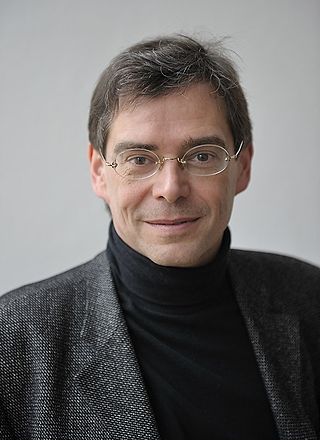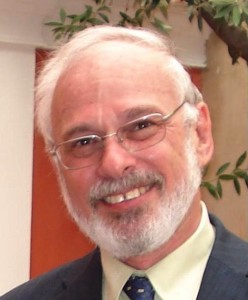Related Research Articles
Guy Goodwin is a senior research fellow and until recently was the W.A. Handley Professor of Psychiatry at the University of Oxford (2014). A fellow of the Academy of Medical Sciences, Goodwin has served as principal investigator in many clinical trials for the treatment of bipolar disorder. He is also an Emeritus Senior Investigator at the National Institute for Health and Care Research (NIHR) and has been on the advisory boards of numerous research councils. He was President of the European College of Neuropsychopharmacology from 2013 to 2016.

Jeffrey Alan Lieberman is an American psychiatrist who specializes in schizophrenia and related psychoses and their associated neuroscience (biology) and pharmacological treatment. He was principal investigator for CATIE, the largest and longest independent study ever funded by the United States National Institute of Mental Health to examine existing pharmacotherapies for schizophrenia. He was president of the American Psychiatric Association from May 2013 to May 2014.
Jules Angst is a Swiss academic who is Emeritus Professor of Psychiatry at Zurich University in Zurich, Switzerland, and Honorary Doctor of Heidelberg University in Heidelberg, Germany.
The European College of Neuropsychopharmacology (ECNP) is a pan-European, non-profit scientific association that serves as a platform to exchange and promote research in the field of neuropsychopharmacology. The ECNP “is committed to ensuring that advances in the understanding of brain function and human behaviour are translated into better treatments and enhanced public health”. The ECNP organises a number of activities to achieve this aim, such as a yearly congress, workshops, seminars, New Frontiers Meetings, publications, awards, supported talks and much more.
Celso Arango is a psychiatrist who has worked as a clinician, researcher, and educator in psychiatry and mental health, notably in the field of child and adolescent psychiatry, psychosis, and mental health promotion.

Andreas Heinz is a German psychiatrist and neurologist.

Eduard Vieta Pascual is a Catalan psychiatrist from Spain known for his work in the field of mood disorders. His unit is a world reference in clinical care, research and teaching of bipolar disorder and depression.
Mark J. Millan is a neuroscientist specialising in the study and improved treatment of disorders of brain. He was the Director of Pharmacological Innovation for the Central Nervous System (CNS) at the Institut de Recherché de Servier (IDRS) in Paris, France. He also served as the Secretary of the European College of Neuropsychopharmacology. Currently he is a visiting professor in the School of Psychology and Neuroscience at the University of Glasgow. Born in Edinburgh, he is the son of former Scottish Labour Party Leader and European Commissioner, Bruce Millan. He studied at Cambridge University and then spent ten years at the Max Planck Institute of Psychiatry, Munich, before moving to Paris.

Gil Zalsman is an Israeli psychiatrist and child psychiatrist, the Director of the Geha Mental Health Center, Petach Tikva, Israel, where he also heads the Adolescent Day Unit.
Wim van den Brink is emeritus Professor of Psychiatry and Addiction at the Academic Medical Center, University of Amsterdam. He was Director of the Amsterdam Institute for Addiction Research (AIAR) and Scientific Director of the National Committee for Treatment of Heroin Addiction (CCBH) in Utrecht, the Netherlands.
Peter Propping was a German human geneticist.
Martien J. H. Kas is professor at the Groningen Institute for Evolutionary Life Sciences, University of Groningen, the Netherlands, where he leads a research group entitled "Behavioural Neuroscience". His research aims to develop a quantitative, transdiagnostic and translational neurobiological approach to the understanding of neuropsychiatric disorders in order to accelerate the discovery and development of better treatments for patients with those disorders. The ability to precisely link neuropsychiatric symptoms to underlying neurobiology will not only facilitate the development of better treatments, it will also allow physicians to provide patients with a better understanding of the complexities and management of their illness.
Joseph Zohar is the director of Psychiatry and the Anxiety and Obsessive Compulsive Clinic at the Sheba Medical Center in Tel HaShomer and professor of psychiatry at Tel Aviv University, Israel. He is the founder of the World Council on Anxiety as well as the Israeli Consortium on PTSD. He currently leads the chief installation of the Israeli Defense Force for the treatment of PTSD. He was a longtime member of the executive committee of the European College of Neuropsychopharmacology, of which he is a former president, and chairman of the Expert Platform on Mental Health.
Elisabeth Binder is a medical doctor and neuroscientist specializing in the study of mood and anxiety disorders. She is the director of the Department of Translational Research of the Max Planck Institute of Psychiatry in Munich, Germany. In addition to research, she serves as Vice-President of the European College of Neuropsychopharmacology (ECNP) and is a member of the Executive Committee.
F. Markus Leweke is a German psychiatrist and psychotherapist. He is a professor and Chair in Youth Depression Studies at the Brain and Mind Centre of the University of Sydney, Australia and a work group leader at the Central Institute of Mental Health in Mannheim, Germany.
Hans-Ulrich Wittchen is a clinical psychologist, psychotherapist and epidemiologist. He has been a head of the Institute of Clinical Psychology and Psychotherapy and the Center of Clinical Epidemiology and Longitudinal Studies (CELOS) at the Technische Universität Dresden. Since 2018, he is leading the research group "Clinical Psychology and Psychotherapy Research" at the Psychiatric Clinic of Ludwig-Maximilians-Universität München and directs the IAP-TU Dresden GmbH in Dresden.
Wolfgang Maier is a German psychiatrist and psychotherapist.

Walter Wolfgang Fleischhacker is an Austrian psychiatrist and psychotherapist. Previously professor of psychiatry at the Medical University Innsbruck, he was appointed president of the university on 1 October 2017.

Prof. Robert Haim Belmaker, is an Israeli psychiatrist who has had major academic positions in Israeli psychiatry since 1974. He had a formative influence on biological directions in Israeli psychiatry. He was Hoffer-Vickar Professor of Psychiatry at Ben-Gurion University of the Negev, Beersheva Israel until his retirement and is now Emeritus.
Andreas Reif is a German psychiatrist. He is director of the Clinic for Psychiatry, Psychosomatics and Psychotherapy at the University Hospital Frankfurt.
References
- 1 2 "Prof. Dr. Andreas Meyer-Lindenberg: UMM Universitätsmedizin Mannheim". Heidelberg University. Retrieved 1 October 2019.
- ↑ "Prof. Dr. med. Dipl. math. Andreas Meyer-Lindenberg CV" (PDF). Retrieved 1 October 2019.
- ↑ Gewin, Virginia (June 2007). "Andreas Meyer-Lindenberg, director, Central Institute of Mental Health, Mannheim, Germany". Nature. 447 (7147): 1028. doi: 10.1038/nj7147-1028a . ISSN 0028-0836. PMID 17654769.
- ↑ Dobbs, David (8 July 2007). "The Gregarious Brain". The New York Times Magazine. ISSN 0362-4331 . Retrieved 1 October 2019.
- ↑ Baggaley, Kate (13 May 2019). "City life damages mental health in ways we're just starting to understand". Popular Science. Retrieved 1 October 2019.
- ↑ Abbott, Alison (June 2011). "City living marks the brain". Nature. 474 (7352): 429. doi: 10.1038/474429a . ISSN 0028-0836. PMID 21697920.
- ↑ Birch, Hayley (8 October 2015). "Where is the world's most stressful city?". The Guardian. ISSN 0261-3077 . Retrieved 1 October 2019.
- ↑ "The Executive Committee". ecnp.eu. Retrieved 30 July 2024.